
By Yeo Eng Ling Lynn, Librarian, Collection Management & Strategies
Sustained professional development and continuous learning are critical for our academic and research environment. To stay agile, SMU Libraries subscribe to a collection of resources that allow you to do self-learning and enhance your skills and expand your capabilities.
These cover everything from soft skills to coding skills to advanced research techniques.
These include
- LinkedIn Learning
- Udemy Business
- DataCamp
- Sage Campus (trial up to 30 November)
Need more intensive research training that goes beyond this? Other fee required platforms are often popular with researchers, these include Instats.org and ICPSR Summer Program in Quantitative Methods
These include self-paced courses spanning across self-development, technical, and research skills. Here are some resources you can explore:
Linkedin Learning
LinkedIn Learning — curated, publisher-produced courses spanning business, tech, and especially soft-skills, tied to LinkedIn's skills taxonomy and career-oriented learning paths.
Best for: organization-wide upskilling (including non-technical staff) - skills mapping, career paths, and L&D analytics matter.
LinkedIn Learning is an online platform offering more than 15,000 courses, focusing on developing skills across business, technology, and creativity. Courses are conducted by industry experts and are self-paced for flexible learning. You can filter your search by course level, from beginner to intermediate to advanced, and by topics. We have also integrated content from some of our other subscribed resources, Udemy Business and O'Reilly Ebooks, so they are discoverable on this platform as well. However, one downside of the search is that you can't filter it by creation date, meaning popular courses usually appear at the top of the search results but may not be the most recently updated. Some of the topics covered include Project Management, Data Visualisation, AI Productivity Tools, Leadership skills, and Personal Development skills.
Some of the courses include How to Research and Write Using Generative AI Tools, which gives an introduction on how you can use generative AI to improve research and writing strategies. Data Visualization: Storytelling explores methods to do storytelling to the broader audience. Within the course, you can use the AI Collaborator feature to ask questions about the course or get a summary and key takeaways.
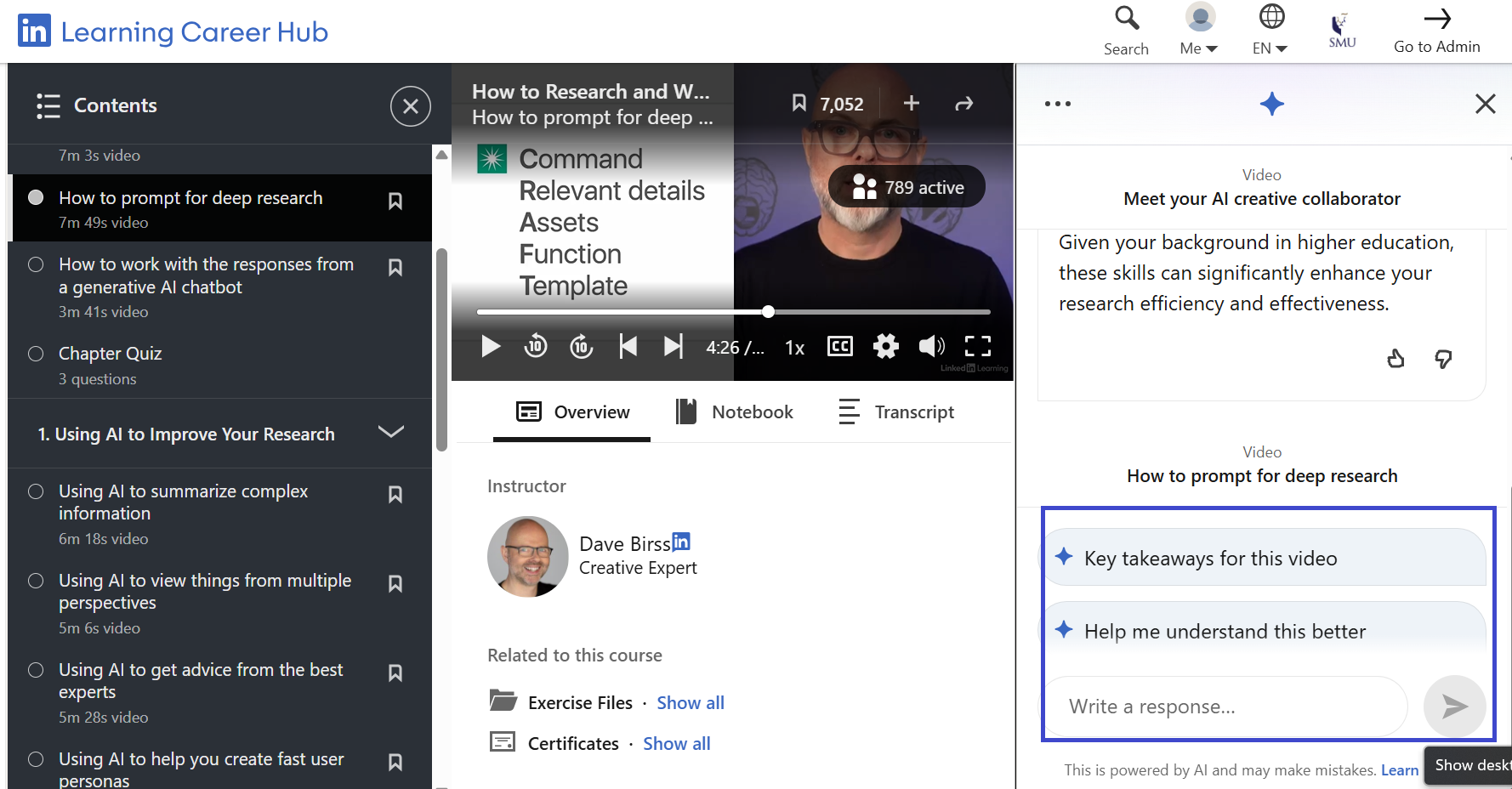
LinkedIn Learning has an AI Coaching chatbot service that provides personalised learning advice and recommend courses to help users build their skills.
More information: Introducing LinkedIn Learning's AI-powered Coaching
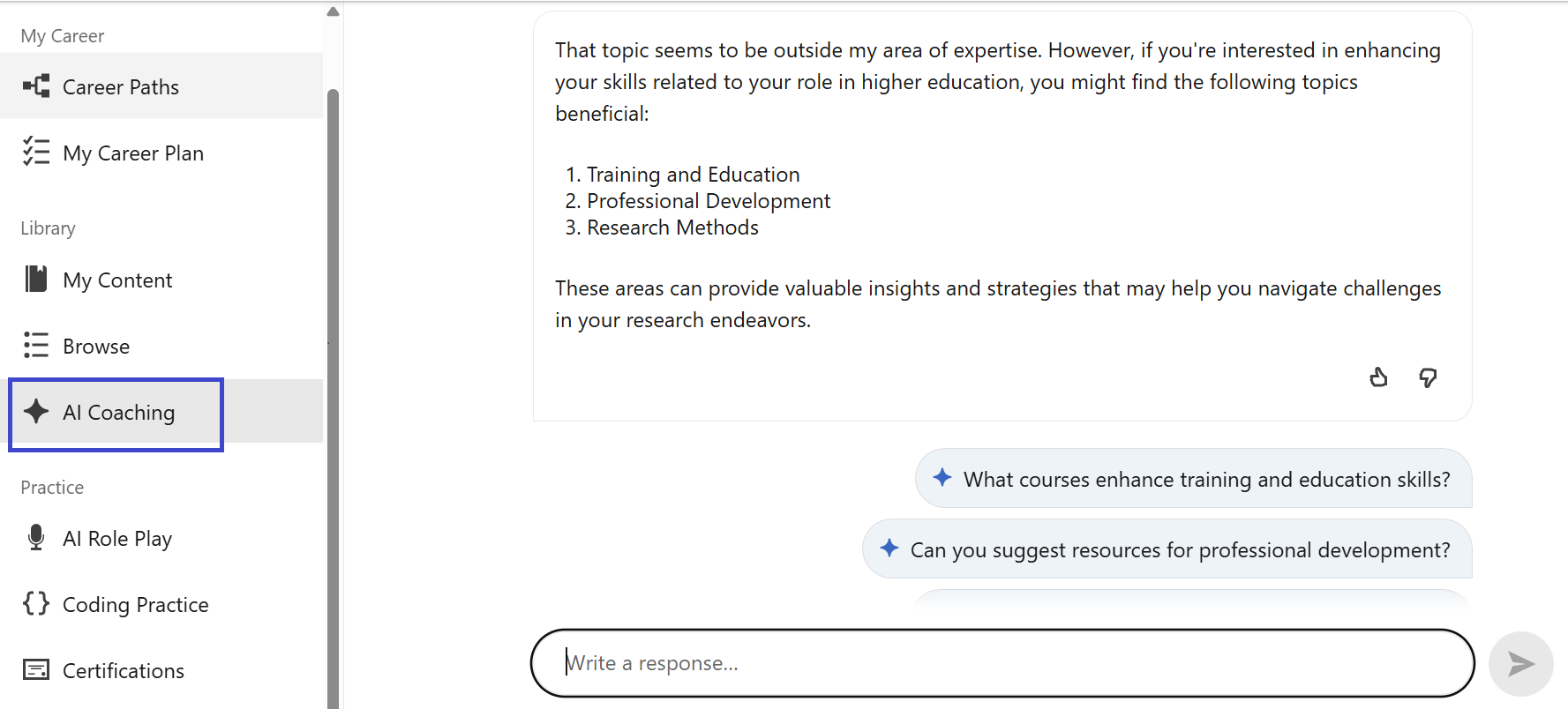
They have enhanced the feature to include AI Role Play Practice as well, which allows users to practice their skills and strengthen their confidence to navigate challenging situations at work by selecting a role play scenario to practice and then interact using text or voice. AI generates responses for the role play based on how the conversation is progressing. After each session, users receive feedback and LinkedIn Learning provide course recommendations to close any skill gaps identified during the role play.
More information on role play: Role play practice with AI-powered coaching
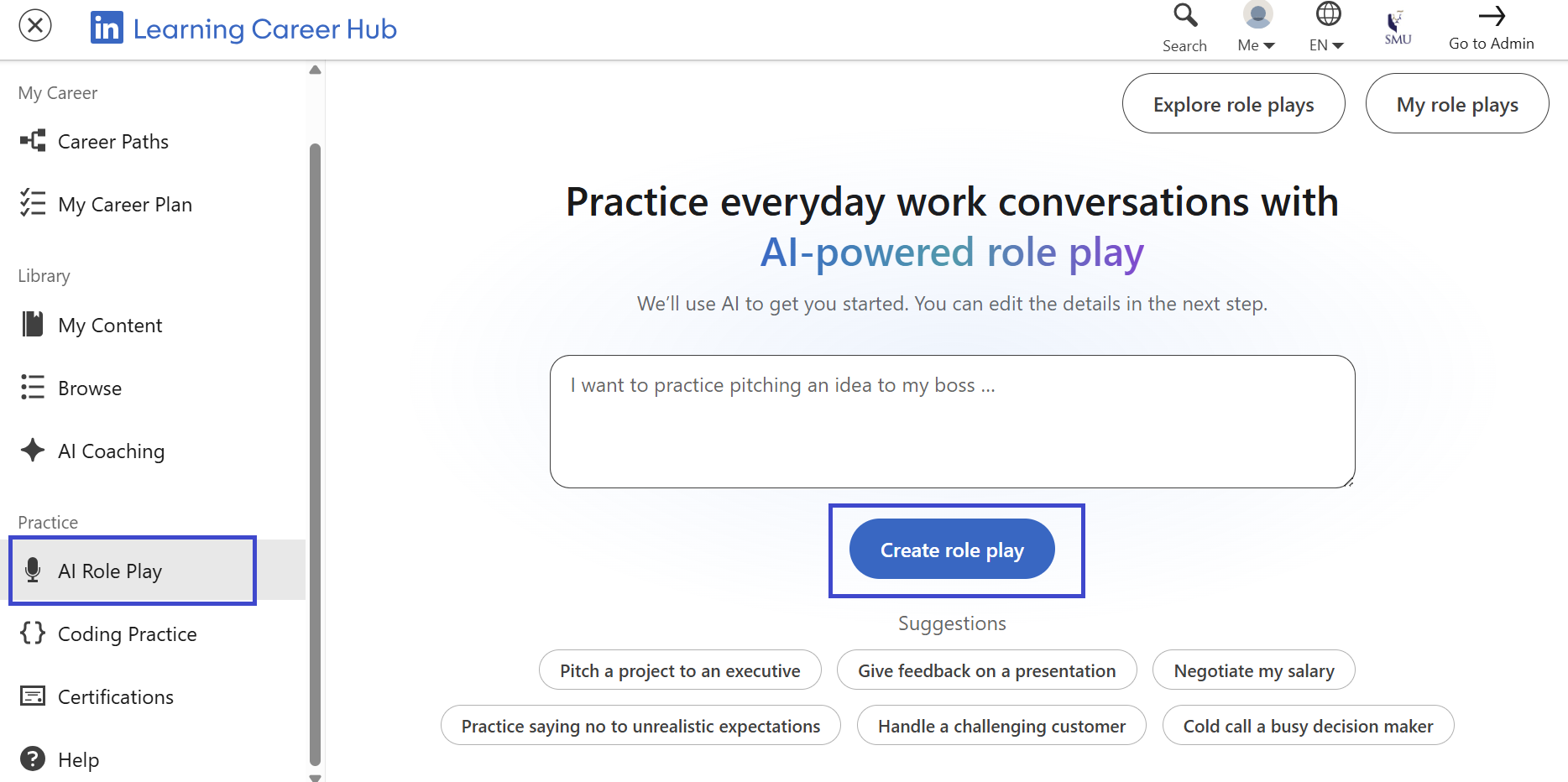
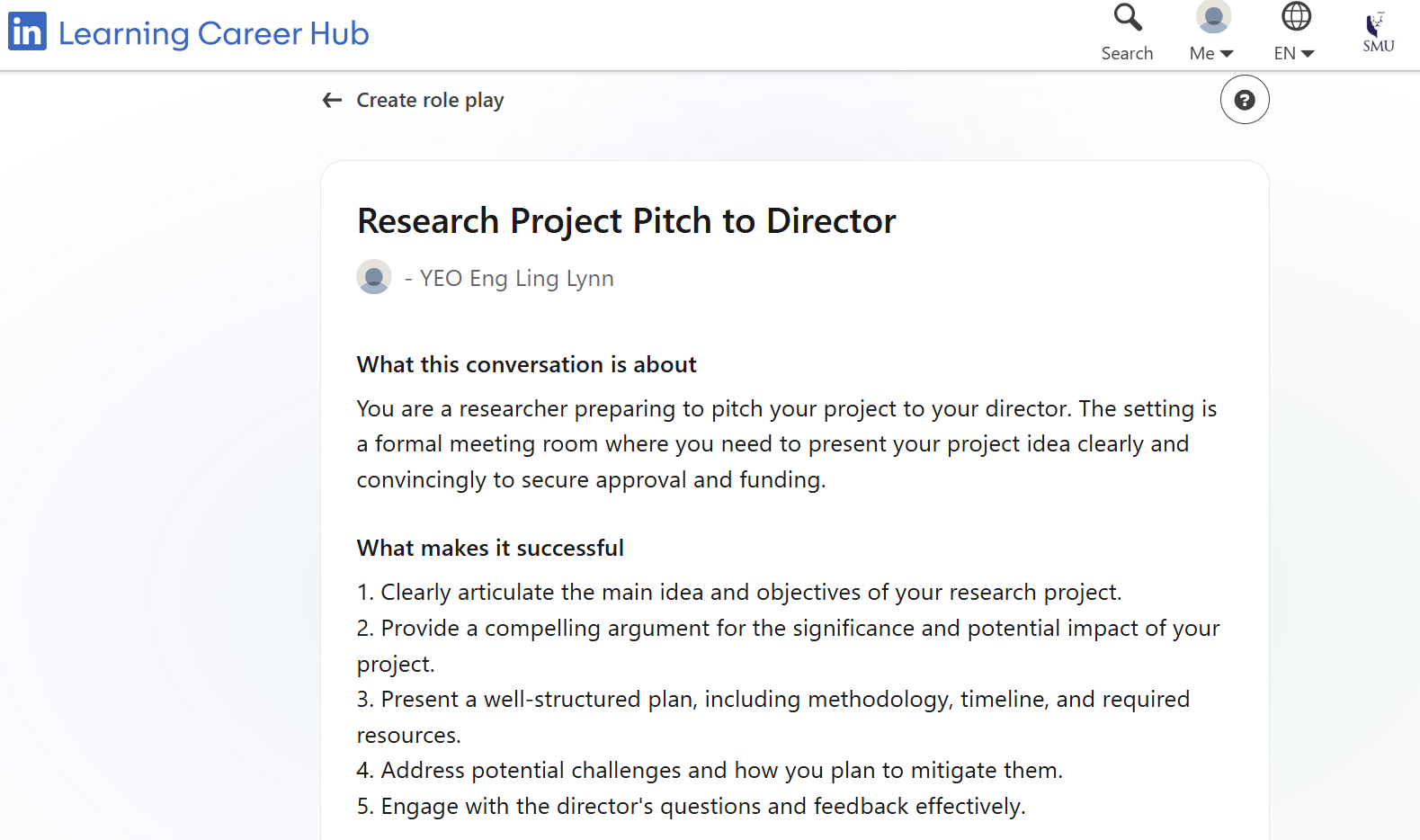
To access Linkedin Learning via a mobile device or via it's app, refer to more information here: How can I access LinkedIn Learning via a mobile device or via the app?
After completing a course, you can also add your certificate to your Linkedin profile:
Add Learning Certificates of Completion and Skills to your LinkedIn profile
Udemy Business
Udemy Business — gigantic marketplace catalog that updates fast
Best for: breadth and speed on fast-moving tech topics, plus practical labs for engineers and IT.
Udemy Business is a comprehensive online learning platform offering a vast collection of more than 10,000 courses. Unlike the Udemy marketplace, where any instructor can create a course leading to a wider variety of quality, Udemy Business is a subscription-based service for organizations, with a curated selection of top-rated content. Udemy Business covers many categories, including data science, generative AI, cloud computing, and personal development topics such as language learning and health and fitness. Some courses include Python Mastery: 100 Days, 100 Projects, which helps to enhance your python skills, or Research Methodology, which covers how to design and execute a research project. Don't forget to download your certificates upon completion of the courses.
Udemy Business has also launched an AI Assistant on the Udemy Business platform for selected courses, where users ask questions and it will provide concept explanations and summaries about the course content, practice scenarios, and code examples.
More info: How to Access and Use the Udemy AI Assistant
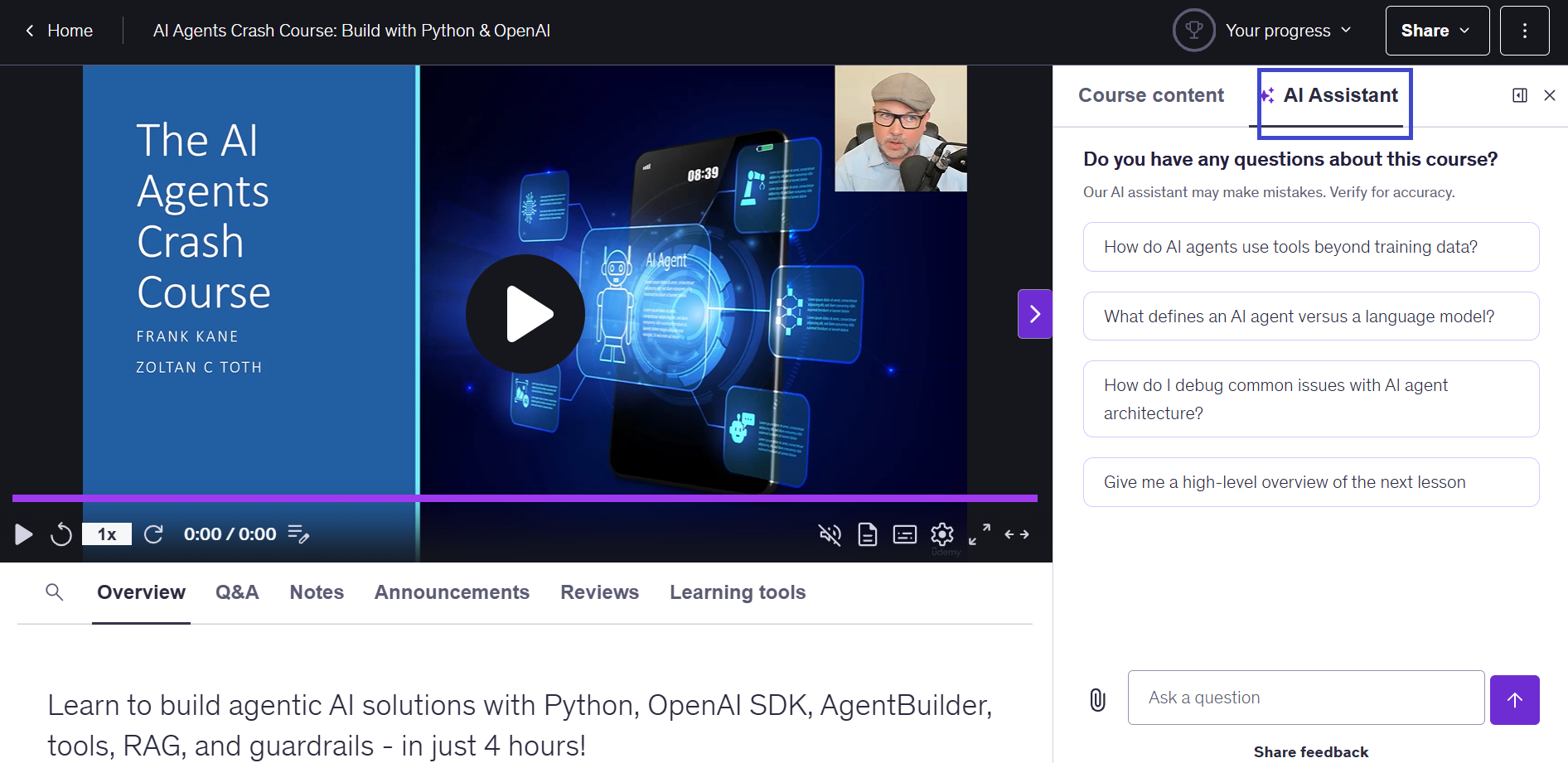
Udemy AI Role Play is also available for selected courses, for user to practice through scenarios based on the content of the course.
More info: Introducing Role Play
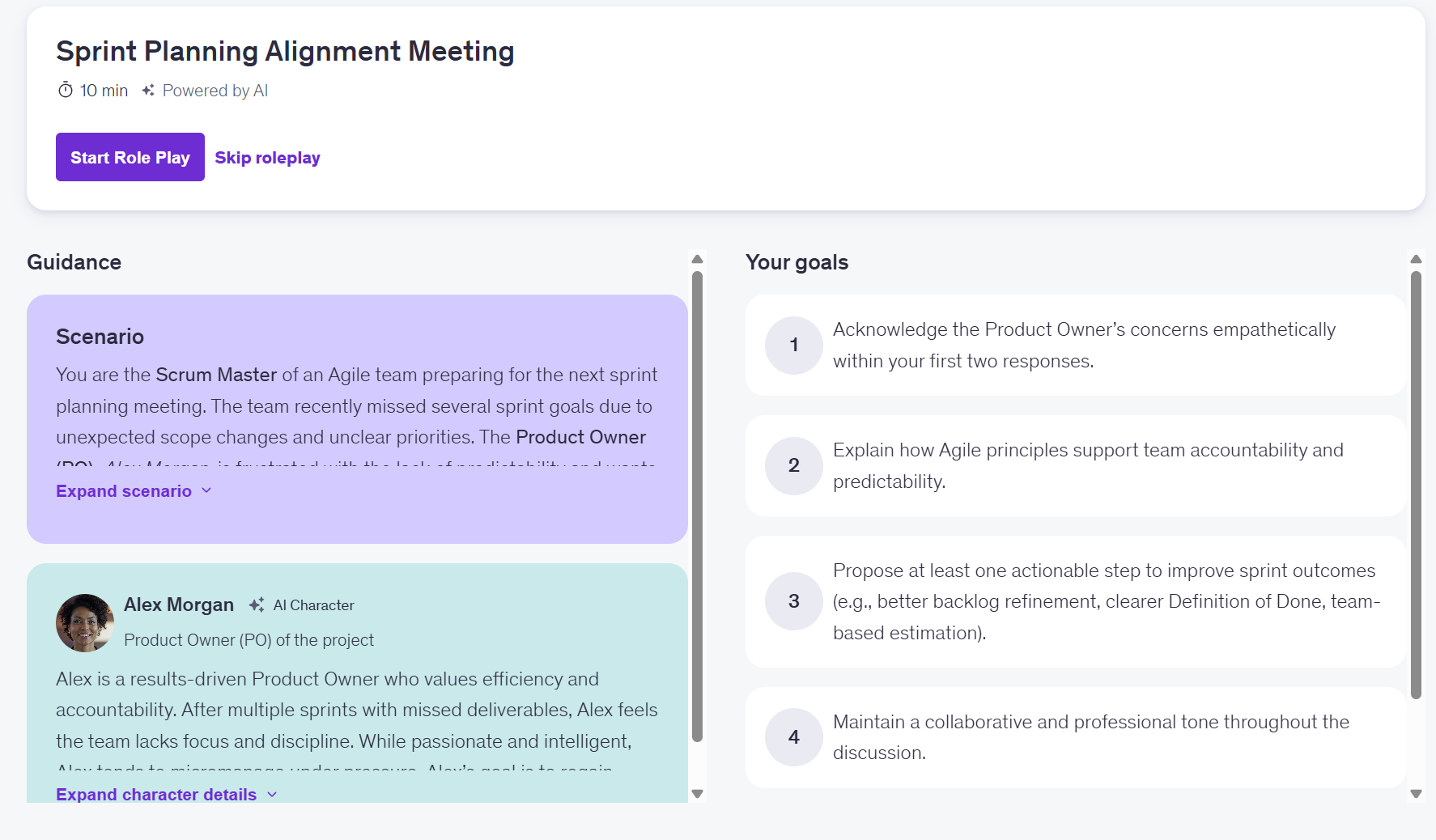
While LinkedIn Learning is strong in soft skills and business topics, Udemy Business offers a good range of courses in technical skills, programming languages, technical tools, and certification exam preparation, making it a good complement for technical professionals, as well as researchers who want to acquire coding or software skills. The trainers for LinkedIn Learning are industry experts invited by LinkedIn Learning and therefore offer consistent quality and credibility. The trainers in Udemy Business are curated and top-rated instructors from the Udemy marketplace based on their professional relevance and higher learner ratings. Because these instructors can create and publish courses faster, the technical courses tend to be more updated. Although both LinkedIn Learning and Udemy Business have hands-on exercises in some of their courses, many of the courses focuses on a video course format.
Datacamp
DataCamp — focused on data & AI (Python, R, SQL, BI) with in-browser interactive coding, assessments, projects, and optional certifications; strong team/enterprise offering.
Best for: structured data/AI skill-building with true "learn-by-doing" and verifiable certifications.
DataCamp is a specialised online platform offering over 500 courses, projects and practices designed by industry experts, enabling learners to build up skills in the areas of data science, programming, and analytics. The content covers key tools that researchers need, including topics such as Python, SQL, R, data engineering, machine learning, AI, Tableau, Power BI, and ChatGPT.
The platform includes interactive coding exercises in a hands-on learning environment where you can apply concepts immediately. This is more engaging than static e-learning platforms or video-only courses. This learn-by-doing approach can help to develop practical fluency and muscle memory in analytical tools.
The courses and projects are organised into skill tracks (e.g. Machine Learning) and career tracks (e.g. Data Scientist) that guide you from foundational concepts to advanced application. Some of the most popular courses include Introduction to Python and Introduction to SQL, which are ideal for building foundational programming and data querying skills. The platform also includes DataLab, an AI-powered data notebook that allows learners generate codes, explore datasets, and do real-time editing and commenting for team projects.
We have limited licenses, please contact rds@smu.edu.sg to request.
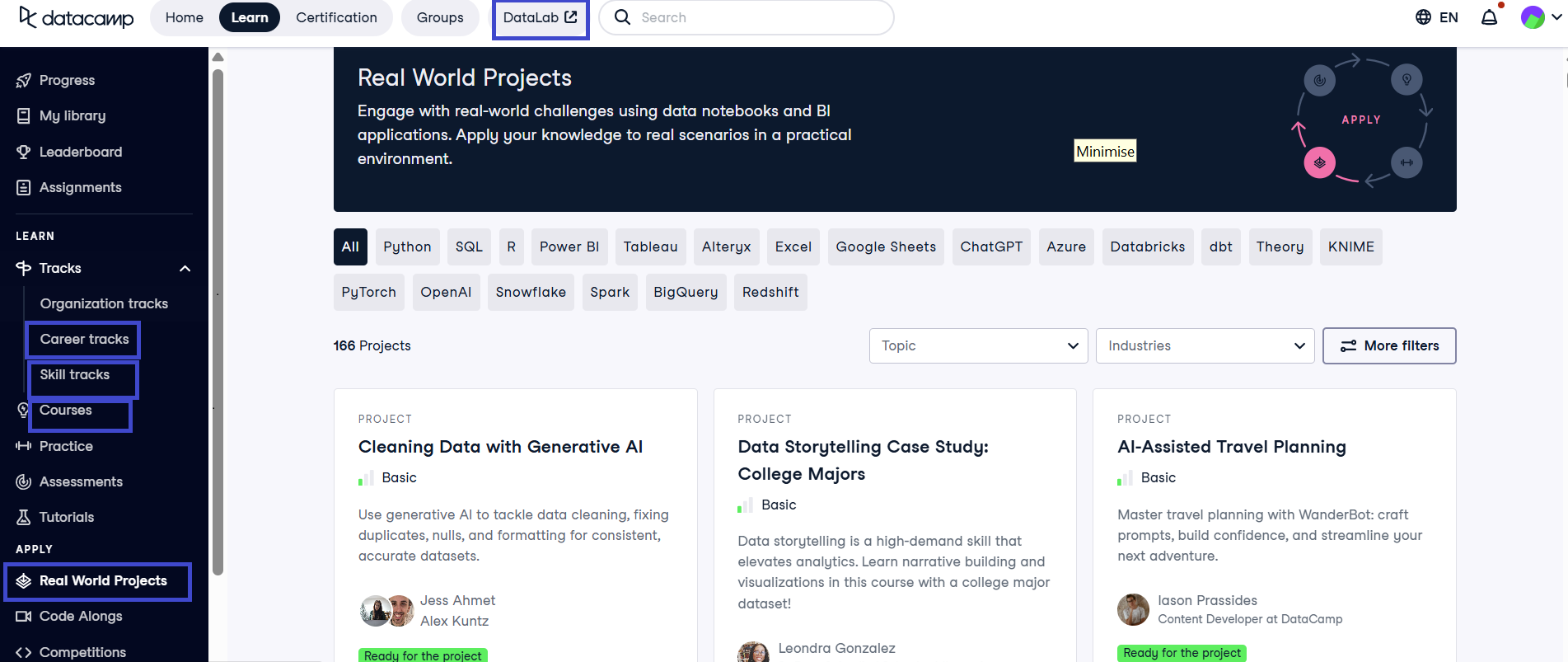
New trial : Sage Campus (up to 30 November 2025)
SAGE Campus — academic, institution-licensed courses on research methods, information/data literacy, stats, and related study skills (aimed at students, researchers, and librarians).
Best for: scaffolded research-methods and data-literacy training aligned to academic workflows.
Sage Campus offers a collection of about 70 self-paced courses structured to help you build up skills in various topics. The courses cover topics ranging from literature synthesis and research design to statistical analysis and data management. They also include training on current technical applications, such as integrating APIs for data collection and the ethical application of generative AI in scholarly work. We currently have trial access to Sage Campus until 30 November 2025.
The course offerings are organised into the following categories:
Information Literacy: Focuses on the developing your search strategies and critical evaluation of sources.
Data Literacy: Covers fundamental concepts such as statistical significance, analysing qualitative data, and effective data visualisation.
Data Science Skills: Provides courses in introduction to R and Python, quantitative text analysis and other research techniques.
Research Skills: Includes topics such as research design, research ethics, presentation of research results.
Getting Published: Offers guidance on the process of journal article submission, manuscript preparation, and navigating the academic peer-review and publishing system.
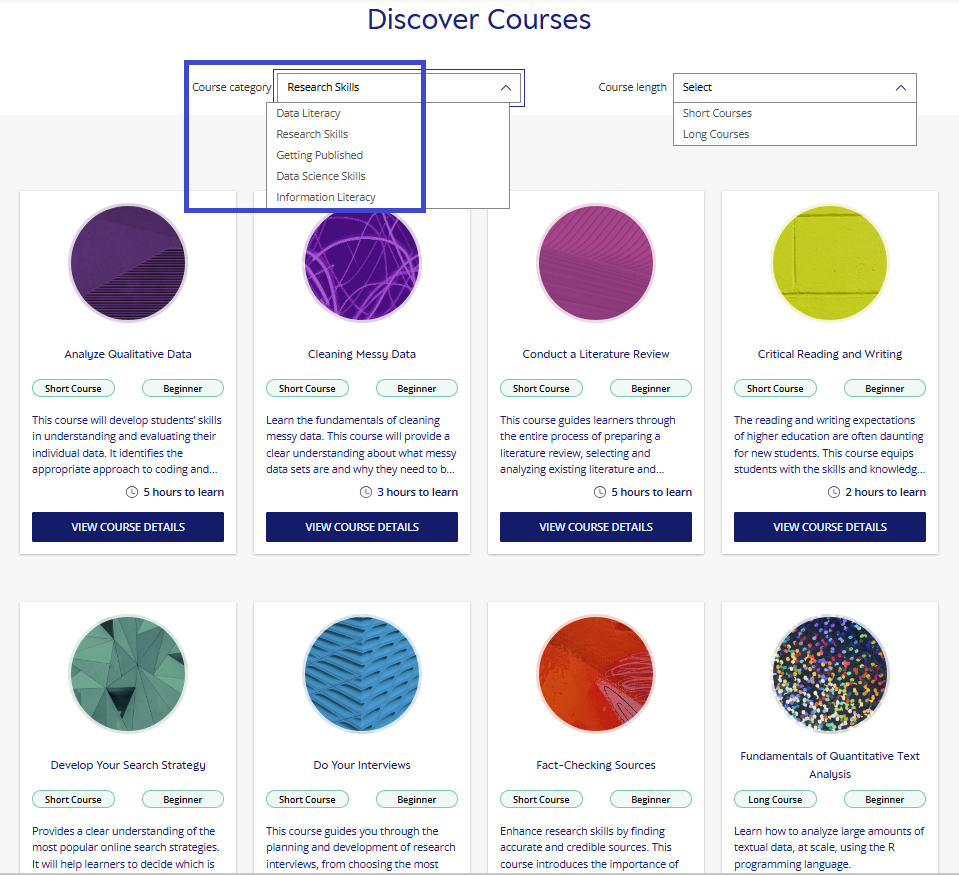
If you find Sage Campus useful, we would like to hear from you, please let us know your feedback through this feedback form.
Other platforms (payment needed)
For even more advanced academic training and learning – the following can be considered. However, charges apply and will not be borne by the library.
- Instats (instats.org) — an academic-led platform for research-methods training with 350+ live and on-demand seminars/courses across quant, qual, and software (R, Stata, SPSS, NVivo). There are live Zoom + recordings available for later viewing. SMU is a institution member which allows discounted fees to access courses
- ICPSR Summer Program in Quantitative Methods (https://www.icpsr.umich.edu/sites/icpsr/sumprog) — the long-running (since 1963) summer school in quantitative methods are intensive General Sessions plus 1–2-week Topical Workshops, offered in Ann Arbor and online; 80–90+ courses spanning intro stats through Bayesian/ML. This are perhaps the most rigorous content you can get in this list. SMU is a institution member, however charges apply for attending.